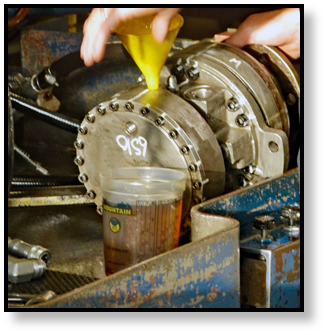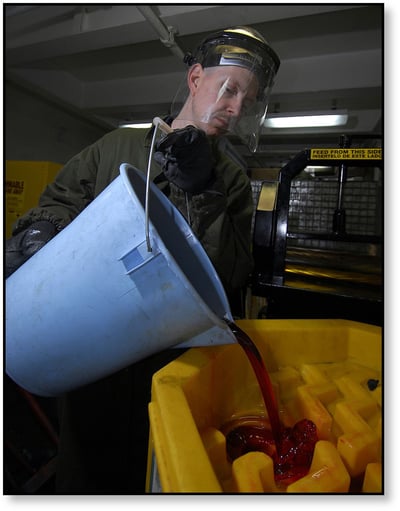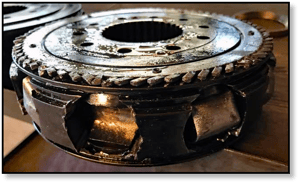In past blog posts, we’ve talked about when to flush your hydraulic system. As you probably know, there is a major difference between flushing a hydraulic system (which involves a great deal of time, quite a bit of hydraulic fluid, and multiple filter changes) and merely changing out the fluid. Still, it seems, there is some confusion about when to change out your hydraulic fluid, and manufacturer guidelines can be a bit misleading.

Here are a few other blog posts you might find useful ...
- How to Flush Your Hydraulic System
- What Causes Hydraulic Fluid to Overheat
- Hydraulic Contamination Issues in Newer Machines
Myths and Facts About Changing Hydraulic Fluid
Contrary to popular belief, there is not a certain number of hours of operation after which you have to change out hydraulic fluid -- but it does eventually need to be replaced. Like other components, hydraulic fluid essentially wears out over time. The best way to determine if your fluid is worn out would be performing a fluid analysis. That ensures that you don’t waste perfectly good hydraulic fluid by changing it too soon or damage your equipment by waiting too long.
Hydraulic Fluid and Overheating
The problem is that there are certain things that will cause your hydraulic fluid to age, or wear out, more quickly. One of these issues is overheating. Hydraulic fluid has an operating temperature range within which it performs its best and will last the longest.

When hydraulic fluid is exposed to extreme temperatures repeatedly or for extended periods of time, then the chemicals and additives that make it work will begin to break down chemically through a process known as oxidation. Oxidation takes place naturally over time for hydraulic fluid, but heat greatly accelerates the process.
Oxidation of Hydraulic Fluid
Oxidation, natural or unnatural, compromises your fluid and is the driving factor behind changing your hydraulic fluid. You can tell when your fluid has been overheated by noticing the color: dark colored hydraulic fluid is a good sign that it has overheated, and it may also be accompanied by a bad odor.

Contaminated Hydraulic Fluid
Water contamination, and contamination in general, will compromise the performance of your hydraulic fluid and can seriously damage components if there is more contamination than your hydraulic filters can handle. If your hydraulic fluid starts looking cloudy, that’s a good indication you have some water contamination. Another type of contamination you might not immediately think of is topping off your fluid level with the wrong type of fluid. These are all cases in which you need to change your hydraulic fluid.
Note: In cases of severe particle contamination, keep in mind that flushing may be required and the source of contamination must be addressed.

Conclusion
Hydraulic fluid only needs to be changed if it has been overheated and started to oxidize, is contaminated (usually by water or adding the wrong type of fluid), or fluid analysis reveals that it has aged to the point that the additives are depleted and it has begun to oxidize. To change it any sooner is unnecessary and provides no real benefit to your machine.
Texas Final Drive is your partner in providing new or remanufactured final drive hydraulic motors from a single mini-excavator to a fleet of heavy equipment. Call today so we can find the right final drive or hydraulic component for you, or check out our online store to find your O.E.M. manufacturer brand motor now.


